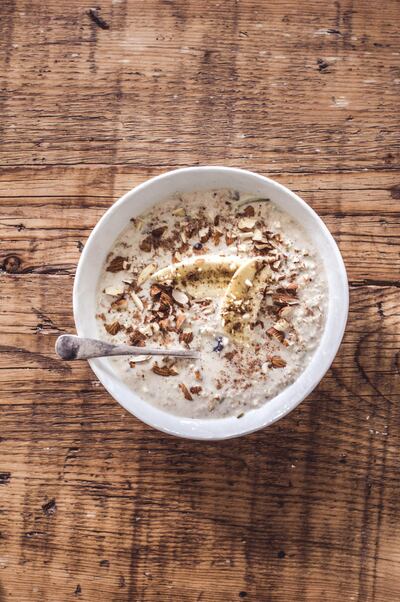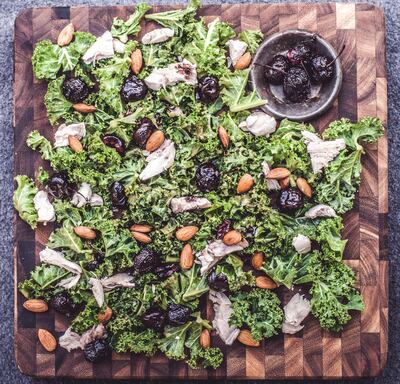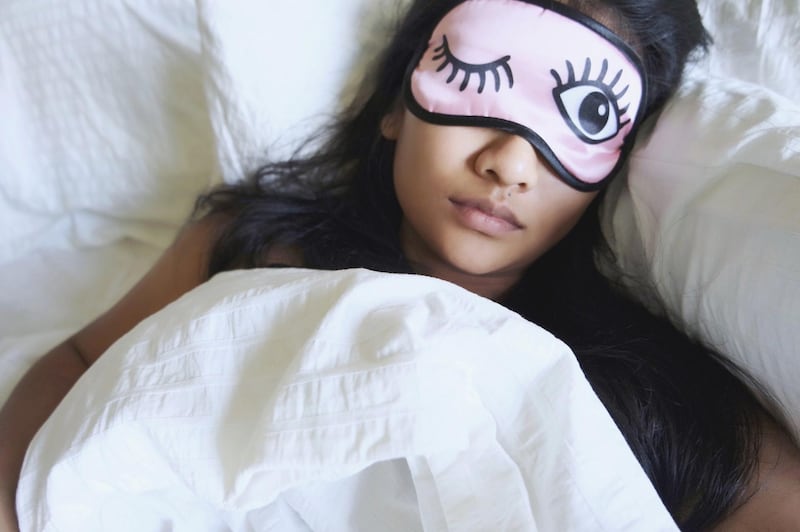Dr Saliha Afridi, a clinical psychologist and managing director of The LightHouse Arabia and Dr Irshaad Ebrahim, a specialist neuropsychiatrist and sleep physician at The London Sleep Centre Dubai, give their top foods to induce snooze, as well as what you should avoid...
Sleep inducers
Cherries
Rightly lauded for their high antioxidant count and anti-inflammatory properties, fibre, vitamin and mineral-rich cherries are also one of the few natural sources of melatonin. What that means is that drinking cherry juice or incorporating cherries into your diet could help regulate your sleep cycle, allow you to drift off more easily and even sleep for longer. A word of caution: the maraschino cherries used to garnish mocktails will not have the same effect as a handful of tart morello cherries.
Milk
It might be a cliche, but a mug of milk before bed may well send you in the direction of the land of nod. Milk contains all-important tryptophan and is also rich in the mineral magnesium, which encourages muscle relaxation and guards against restless leg syndrome, a well-known sleep inhibitor and one associated with magnesium deficiency. Not only that, Ebrahim says establishing a calming nightly ritual, such as sipping a hot drink, can significantly contribute to healthy long-term sleep patterns.
Bananas
This fruit ticks all the right boxes when it comes to encouraging sleep. Bananas contain the natural muscle relaxants potassium and magnesium, as well as tryptophan and B vitamins associated with reducing stress levels. They are also filling enough to curb hunger pangs, easy to digest and won’t leave you feeling overly full.
Almonds
A handful of nutrient-rich, hunger-sating almonds is nearly always a good idea: the nuts are high in fibre, protein and antioxidants, and provide an excellent source of heart-healthy (monounsaturated) fats, as well as magnesium and tryptophan. Snack on the unsalted variety to avoid waking up thirsty in the night.
Turkey
Tryptophan-rich turkey has a reputation for making us feel sleepy – think about the post-feast fug you experience on Christmas day. The meat is lean and low in fat, making it an excellent choice for a light evening meal, especially when matched with kale (which contains all nine essential amino acids, including tryptophan), cherries and almonds. To see what we mean, try the recipe on the left.
Sleep saboteurs
Caffeine
An obvious one, yes, but it’s not just coffee that should be shunned. Afridi says that if you’re struggling to sleep, try cutting out tea, caffeinated soft drinks such as Coca-Cola, and chocolate in the six hours leading up to bedtime.
Fatty food
Ditch the late-night takeaway order if you want to sleep well. High fat and high salt food such as pizzas, burgers and fries are difficult to digest, and can cause heartburn, indigestion and excessive thirst.
Spicy food
Whether it’s nachos strewn with chilli or a fiery curry, it will come as no surprise that spicy food often induces a bout of indigestion, which in turn interrupts sleep. It’s also worth noting Afridi’s advice, that in order to successfully initiate sleep, our core body temperature needs to drop by a degree, and consuming spicy food can do the opposite.
More on the matter...
As any glassy-eyed, vacant-looking new parent will tell you, a lack of sleep is no laughing matter. According to a recent survey by furniture outlet Ikea, it's not only those with newborns who are suffering, though – one in three UAE residents is missing out on much-needed kip. To capitalise on this news, the company sent its branded "nap truck" on a tour of the UAE, offering bystanders the chance to hunker down for a snooze.
We all know we need sleep, but as we hit play on that extra episode of our current Netflix addiction, or fall down an hour-long Instagram tunnel just before bed, the majority of us probably aren’t aware of how big a sacrifice we’re making. “Sleep is not a nice-to-have pleasure, it is absolutely critical for mental and physical health,” says Dr Saliha Afridi, a clinical psychologist and managing director of The LightHouse Arabia.
“Sleep is an essential ingredient for optimal brain function; when compromised, it affects productivity, personal relationships, memory, and mental and physical health,” she says.
Dr Irshaad Ebrahim, a specialist neuropsychiatrist and sleep physician at The London Sleep Centre Dubai, a sleep diagnostic and treatment facility affiliated with the Harley Street-based London Sleep Centre, agrees. “We spend one third of our lives in the sleep state; our sleep quantity and our sleep quality (the two qs of sleep) are essential to our well-being, physical and psychological,” he says.
Ebrahim says that in the short-term, an inadequate amount of sleep results in symptoms of hyperarousal, which leads to daytime tiredness, fatigue and lethargy. Long-term sleep problems, meanwhile, have been linked to weight gain, hypertension, diabetes, high blood pressure, heart disease and hyperglycaemia.
Although the amount of sleep we require to function optimally differs from person to person, Afridi says that, as a general rule, anything under seven hours is considered sleep deprivation. If that sounds like a distant dream, there are a number of things that can be done to rectify the situation, starting with diet. Afridi and Ebrahim agree that there is a correlation between our sleep patterns and what we eat (or don't eat), as well as when we eat it.
Obviously, consuming a heavy, late-night meal is likely to making dropping off to sleep more difficult, but that doesn’t mean you should go to bed hungry. Instead, aim to eat dinner early and allow several hours for your food to digest; if you feel a little peckish later on, have a light, sleep-promoting snack such as a banana or a handful of almonds.
____________________
Read more:
A recovering insomniac shares what she learnt on the road to getting better
Different ways to tackle sleep deprivation and remain healthy
5 common sleep disorders and how they affect you
____________________
It won’t come as any surprise that good sleepers tend to eat a balanced, varied diet and are consistently well hydrated. There is evidence to suggest that certain foods have a greater positive impact on our sleep than others, though, and key to it all is tryptophan. In basic terms, this essential amino acid (which the body can’t produce, so must be obtained through diet) helps to induce sleep by stimulating the production of serotonin, which acts as a natural sedative and is converted into melatonin, the sleep-inducing hormone that helps to control the body’s internal clock.
While Afridi is quick to point out that eating tryptophan-rich food is not going to provide a cure for chronic insomnia, taking positive steps towards establishing good sleep habits – such as eating well – can have a real effect on sleep quality and quantity.
Sleep-friendly recipes to try

Almond oats with honey-whipped yogurt and banana
Serves 2
To prepare: 10 minutes, plus chilling
No cooking required
Ingredients
20g flax seeds
100g rolled oats
300ml milk
80g almonds, chopped, plus extra to serve
1 apple, grated
50g raisins
1/4 tsp ground cinnamon
1tbsp runny honey, plus extra for drizzling
100g Greek yogurt
1 banana, sliced lengthways
Method
Mix together the flax seeds, oats, 250ml milk, almonds, apple, raisins and cinnamon in a bowl. Cover with cling film and chill in the fridge for 6 hours, or overnight.
Tip the yogurt into a bowl, add the honey and whisk together to combine.
When you’re ready to serve, stir the honey and yogurt into the oats. Divide the mixture between two bowls, and top with the banana and extra chopped almonds. Drizzle with honey.

Poached turkey, kale and roasted cherry salad
Serves 2
To prepare: 10 minutes, plus softening
To cook: 30 minutes
Ingredients
200g cherries
1tbsp soft brown sugar
1tbsp balsamic vinegar
4tbsp olive oil
1tbsp Dijon mustard
1tbsp runny honey
1 bunch kale, leaves picked and sliced
200g turkey (or chicken) breast
350ml chicken or vegetable stock (or water)
30g almonds, toasted
Method
Preheat the oven to 1800C, gas mark 4. Put the cherries in a bowl, drizzle with the brown sugar, 1 tsp vinegar and 1 tbsp olive oil, and turn to coat.
Tip on to a baking tray and cook for 15 minutes, or until the berries have softened and started to release their juices.
Put the mustard, honey and remaining vinegar in a large bowl and stir to combine. Season and gradually whisk in the remaining olive oil. Tip in the kale and mix really well to ensure that each piece is well coated with dressing. Transfer to the fridge and leave for 1 to 2 hours to soften.
Set a saucepan with the stock or water over a medium heat. Add the turkey or chicken, reduce the heat and simmer for about 12 to 14 minutes, or until the meat is completely cooked through. Remove from the liquid, leave to cool slightly then shred into pieces.
To serve, arrange the kale leaves on a large plate or platter. Add in the chopped almonds and shredded turkey or chicken. Top the salad with the roasted cherries, spooning over any juices.






